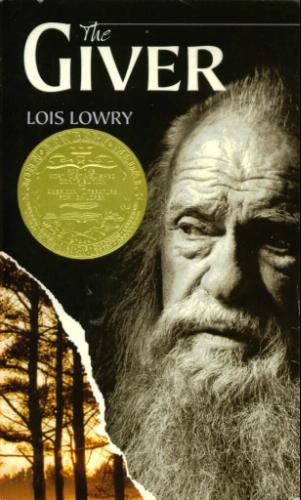One of the ways I judge whether a book did its job or not is if it blows my mind. If I can’t entirely understand it, if I have questions about it, if it’s difficult to put into words what it was about or how it made me feel. It’s also good if I get goose bumps.
The Giver by Lois Lowry is one of those books that leave me utterly confused, nearly crying, and covered with goose bumps. It’s about a world where humans live completely controlled. Their spouses, jobs, number of children, and daily routine have been pre-determined by the government. They don’t have feelings of affection (what they call “Stirrings”) because they take pills for it. There are no colors; true, raw emotions; animals; or holidays. They live in a world of Sameness, all created so that humans don’t make mistakes anymore and everything is perfect. “We don’t dare to let people make choices of their own”, says Jonas, the main character.
In the city where the book is centered, there is one person designated to keep all the memories of the world before Sameness. He is called The Receiver of Memories. Jonas is selected to be the next Receiver and from his first day on, he starts getting memories from the previous Receiver, who tells Jonas to call him the Giver.
This book succeeds to make a point about “perfect worlds”, or at least how we perceive them. The government made a world without pain or suffering, but at what cost? Only Jonas and the Giver know what the color red is, have experienced waking up on a Christmas morning, and feel love towards others. They don’t live real lives because they don’t have the things that make up a meaningful existence. Their world may be safe, but they’re living half-lives and they don’t have free will. One of the things in this book that blows my mind is that they don’t know all of these things, that they haven’t seen a sunset or smelled flowers. Think about that for a second.
In the book, Jonas wants to watch his father release an identical twin. His entire life, Jonas has believed that releasing someone means sending them Elsewhere, to another community. The Giver requests the recording, and together, they watch Jonas’s father weigh the twins, send away the heavier one, and give the smaller one a shot in his forehead. As Jonas watched, “the newchild, no longer crying, moved his arms and legs in a jerking motion. Then he went limp. His head fell to the side, his eyes half open. Then he was still.” Jonas starts screaming that his father would be happy to kill anyone, and the Giver reminds him that he can’t help it because he and the whole community know nothing. “It’s the way they live. It’s the life that was created for them”, the Giver explains. The world may be without suffering, but citizens have become apathetic enough that they can kill others when the need arises without any sympathy.
I would definitely recommend a teenager reading it, mostly because it presents the idea of a perfect world, talks about both sides, and eventually just lets the reader decide which one they think is better. It’s definitely mind-blowing and a very unique and important analysis of a supposed utopia. It has some hard things to deal with and grasp, like the fact that they can kill people without any remorse. Sometimes the book gets pretty depressing, and Jonas receives a good amount of painful and horrible memories from the Giver, like a young man dying on a battlefield, an elephant being killed for its tusks and its family grieving for it, severe loneliness, and terrible physical pain.
One of my writing teachers from school says that the best judge of a book is whether or not it messes you up. I would say, with utter certainty, that The Giver wholeheartedly messed me up.
Nancy Scofield will be a junior in high school. She lives in Washington, DC.
Update: This post was updated to reflect that Nancy will be a junior, not a senior. My apologies.













